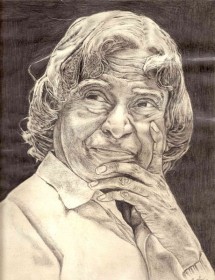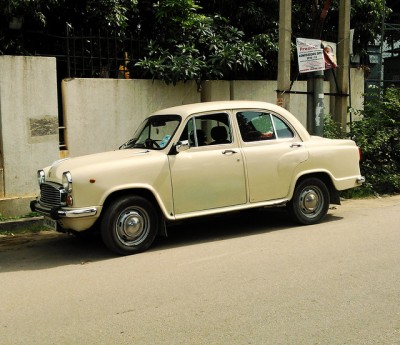by Bhargavi Chandraskekharan
As I travelled into the villages surrounded by lush green forests near Poondi Reservoir (Tamil Nadu) from Chennai, I silently counted the number of photos and hoardings in tribute of one man, Avul Pakir Jainulabdeen Abdul Kalam. The twinkling eyes of Kalam was peering from almost every building which could afford a little space on their door. These were not all political establishments; these were individuals, the ordinary citizens of India who had taken it upon themselves to pay homage to the former President. What is stunning and unprecedented is that most of them seem to have a “Kalam memory”; they claimed to have heard his public speech, or had interacted with him personally, or had read his work, or instinctively knew that Kalam was indeed a great man! As Shakespeare said, “The evil that men do lives after them, the good is oft interred with their bones.” But, is it really possible to leave only positive crumbs behind us as we leave the earth? One wonders.
Kalam was born in the “Marakayar” community, which is a shortened form of “marak kaLam iyakkiyor” meaning, the ‘ones who rowed wooden boat.’ In hindsight it seems understandable that a man born and brought up in the island of Rameswaram should aspire to fly in the sky as a pilot. As destiny would have it, he became one of the masterminds behind India’s missile launch missions and eventually went on to become the Chief Scientific Advisor to the Prime Minister of India. Only riches, no rags, you think?
That Kalam distributed newspaper to support his family and educate himself in his childhood and turned vegetarian to stick to his budget is well-known. But, he was also one of the very few Tamizh Muslims from the caste, religion-torn Ramanathapuram District to make it big in life. Although, he may have a few missiles and a successful nuclear test to his credit, his contribution as Scientist and the alleged success of the projects themselves have been questioned by the grumbling scientists in ISRO-DRDO and also the watchful western media. That all his doctorates have been Honoria causa and not Ph.D. is constantly reminded in hushed tones. What is not given due credit is that Kalam, along with Mr. Soma Raju, created low-cost coronary stents and also light-weight ortho-calipers, the latter innovation dubbed as “bliss” by Kalam.
Now, naysayers would say, forget all that, what did he do as the first citizen of India? He was the first President from a non-political background. The mystery laden portals of the Mughal Gardens were thrown open to the public in his tenure. We have had brilliant personas and dignified individuals, the incorruptible and the extremely corrupt, the simple and royal as Presidents. But, Kalam was a different genre all by himself. He was a wide-eyed boy from the small town, with a brilliant mind and a persona of morning sunshine. Yes, but wasn’t he a rubber stamp President too? The function and powers of the President are well defined in the Constitution of India. Whether we like it or not, ‘President’ is a titular post who has very little leg room to express himself. Kalam too faced the pressure of the office, asserting the dissolution of Bihar Assembly which was declared “unconstitutional” by the Supreme Court of India, and rather unwillingly signing the office of profit bill, which even by Kalam’s own view was “arbitrary.” But these were politico-legal concoctions which the President has to simply gulp down without tasting. What set him apart as a leader was his visit to Gujarat, post the gory Godhra riots in 2002 to remove the pain of the affected and to bring unity in the minds of the people. That a Muslim President chose to visit a state which hosted hardcore Hindus mass murdering innocent Muslims was a telling sign of hope and peace. He went around Gujarat, not once criticizing the state’s role in terrorism, but quietly facilitating and accelerating the rehabilitation process. And, when he left the office, he did not trouble the treasurers much.
Perhaps this is the attitude that best describes the President. He circumvented controversy at all levels as much as possible and chose instead to focus only on the positivity, always keeping in line with the national interest. As a member from the scientist community and someone who worked with the Government closely even before his Presidency, Kalam must have been privy to the internal politics, bureaucratic hurdles and miscellaneous mumbo-jumbos that pinch the everyday functioning of the Government. That a common man with a humble background was neither overwhelmed nor bogged down by the enormity of the predicaments before him is befitting of a man who once had the privilege of being the Supreme commander of tri-forces.
Take the case of AAP, which boasted of intellectuals and “clean” individuals at the helm – it is falling apart. The peaceful protests for making Tamil Nadu a liquor free state has resulted in the untimely death of Gandhian Sasi Perumal, who waged a lifelong crusade against Government after Government to stop the menace. Kalam had found the golden path, where he managed to maintain his dignity and integrity as an individual, worked hard in his office and found time to interact with young citizens of India, without a trace of cynicism. In all these years, we have not known that Kalam, in line with an Islamic tradition, wouldn’t even open accounts in banks that charged heavy interests on loans. We were instead privy to his love for Lord Ram and penchant for playing the Veena. If he faced conflicts, he chose to look beyond it. As much as he invoked Kaniyan Poongundranar’s Purananuru (aTamizh Classic composed 2000 years ago) “yadhum oore, yaavarum kelir,” (that translates to ‘I’m a global citizen, all the people of the world are my kith and kin’) he supported the use of nuclear energy for defense technology as well as civil purposes. Long after his tenure as a President, Kalam has remained the favourite Chief Guest in scientific, educational and cultural institutions for this reason. Wherever he went, he spoke in his rather broken and accented language of the ethereal dream, the need for education, the role of science as an instrument for development of the nation. He believed and made us believe that all the negativity in the world can be won over if one willed to drown it with a dose of positivity, perseverance and sheer passion. This explains why the seer-like Kalam has only courted words of respect even from people who differed from him ideologically. The man had cast a net with his endearing persona, child-like curiosity, sincerity, frankness and an innate simplicity which simply keeps haters at bay.
That Kalam breathed his last amidst the gathering of young men and women, waiting to deliver yet another speech in a prestigious educational institution is a thing of legend. It was as if the divine spirit that he was so moved by had taken the pains to design his death poetically. In his autobiography “Wings of Fire,” which I had extensively quoted in my English “compositions” at school, he talks about his story – of living in the Mosque street at his native, of being reared by Hindu and Christian teachers, of being groomed by the legendary Vikram Sarabhai, of his failures as a scientist and success stories as a leader leading a professional team, and concludes rather plaintively, “this story will end with me, for I have no belongings in the worldly sense. I have acquired nothing, built nothing, possess nothing – no family, no sons, daughters.” He doesn’t know that he has won the hearts of billions, has ignited the minds of the future India and built the edifice for a nation that dares to dream. He doesn’t know that an entire nation wept involuntarily on his death, almost accidentally discovering the extent of impact the man had on them. Perhaps, most of us never really thought the grand old man of India, the teacher, philosopher, scientist, patriot and a human being par excellence could surrender to death. Most of us are right in fact, Dr. A.P.J.Abdul Kalam is immortal.
Thank you, sir! You were a true gem of India.
Pic: Wikimedia Commons






